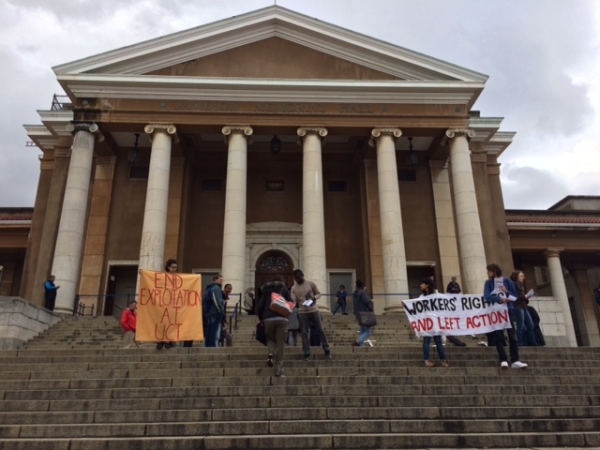

Students protest against working conditions for outsourced workers at UCT. Photo by Ben Stanwix.
30 September 2015
Thomas Piketty, French economist and author of the bestselling Capital in the 21st Century, was due to arrive and deliver a lecture on inequality at UCT on Wednesday afternoon. He was prevented from flying (apparently for not having enough blank pages in his passport) and it was arranged that he would deliver the lecture virtually, via a live stream.
However, due to technical failures this was not possible and as a result a host of unprepared panellists were left to fill the gap by having an improvised discussion about issues of inequality in South Africa.
As it turned out the most compelling people to take the stage were students from the Rhodes Must Fall movement (not on the official program of course).
Before any introductory proceedings began a group of students made their way to the front of Jameson Hall singing and holding banners and white crosses. The intervention was partly in remembrance of the Marikana Massacre but mainly in protest against the current system of outsourcing at the university.
 RMF students take centre stage after Thomas Piketty could not make it to tonight’s event. Photo by Ben Stanwix.
RMF students take centre stage after Thomas Piketty could not make it to tonight’s event. Photo by Ben Stanwix.
In a brief address to the audience, an appointed spokeswoman highlighted the hypocrisy of a lecture on inequality at UCT given the low wages paid to outsourced workers and their exclusion from UCT benefits, and called for an end to the practice.
This was a welcome intrusion into an official event characterised by one unfortunate set of makeshift proceedings after the next, and would perhaps have been saluted by Piketty based on what he writes.
Anyone who has read at least the first chapter of the book will know that although Wednesday’s lecture would have been his first time reflecting at length on South Africa, he is not a complete stranger to the current state of affairs here.
His book begins with a description of the Marikana Massacre, where 34 mineworkers were shot and killed by police at the Lonmin platinum mine in Marikana, on 16 August 2012. He references the massacre because it highlights the worst outcome of extreme inequality taking place in the most consistently unequal country in the world.
Given that Piketty’s work focuses largely on Europe and the United States it would have been interesting to hear his analysis of the South African situation and specifically what he thinks should be done (his upcoming lectures in Johannesburg will hopefully provide opportunity for this). In his latest book his general recommendations favour various forms of government intervention to prevent a slide toward greater inequality, and he is clear, for example, in his support of a global wealth tax.
But the call from RMF, to end the practice of outsourcing, tackles the issue of inequality at a much more local and much more manageable level. It shows up one of the drivers of inequality in a very obvious way. Of course an end to outsourcing won’t lead to decreases in the country’s overall Gini coefficient but it will begin to make UCT a fairer institution.
Stanwix is a researcher at UCT who freelances for GroundUp. GroundUp does not necessarily endorse any views expressed.